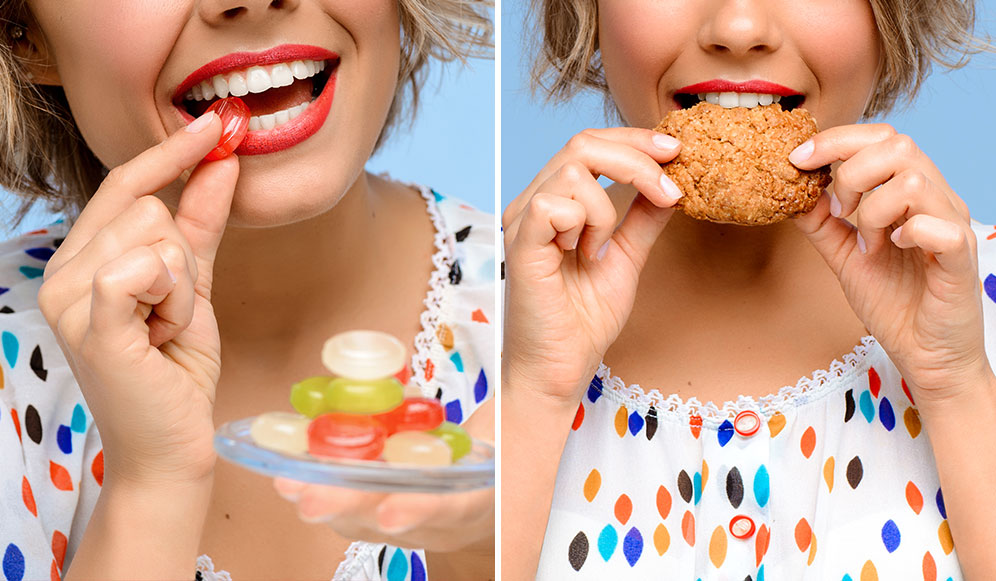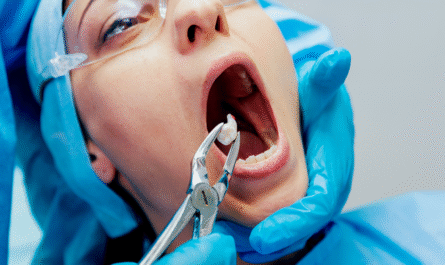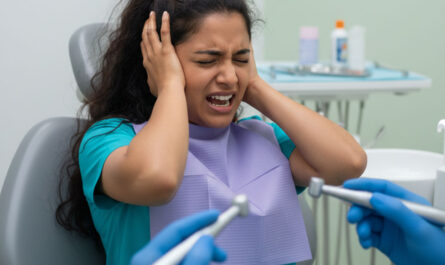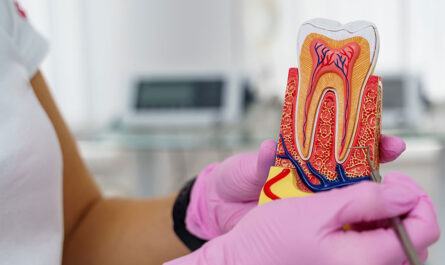The relationship between sugar and dental health extends far beyond simple cavities. As dental professionals at Dr. Irfana’s Dental Studio increasingly recognize the complex interactions between different sweeteners and oral bacteria, understanding these mechanisms becomes crucial for protecting your smile. This comprehensive guide explores how various sugars impact your dental health and provides practical strategies to satisfy your sweet tooth while minimizing damage to your teeth. Our team at Dr. Irfana’s Dental Studio is committed to helping you maintain optimal oral health through education and personalized care.
The Science Behind Sugar and Tooth Decay
How Sugar Fuels Harmful Bacteria
Sugar doesn’t directly damage teeth, it feeds the harmful bacteria that do. When you consume sugar, oral bacteria like Streptococcus mutans metabolize it, producing acids that attack tooth enamel and initiate the decay process. These bacteria form a sticky biofilm called plaque that adheres to teeth, creating an environment where acids can continuously erode enamel if not properly removed.
The Acid Attack Timeline
Within minutes of sugar consumption, bacteria begin producing acids that can demineralize tooth enamel. This acid attack typically lasts 20-40 minutes per exposure, meaning frequent snacking creates an almost continuous acid environment in your mouth. This is why the frequency of sugar consumption often matters more than the total amount consumed in a day.
Different Types of Sugar and Their Dental Impact
Natural vs. Added Sugars
While both natural and added sugars can contribute to decay, their impact differs:
- Natural sugars in fruits come packaged with fiber and water, diluting their effect and slowing absorption
- Added sugars in processed foods offer no nutritional benefits while maximizing decay risk
- The molecular structure of the sugar doesn’t change its cavity-causing potential,your mouth processes table sugar, honey, and maple syrup similarly
Hidden Sugars in Your Diet
Many seemingly healthy foods contain surprising amounts of added sugar:
- Flavored yogurts (up to 7 teaspoons per serving)
- Granola bars (often 3-4 teaspoons)
- Pasta sauces (some contain more sugar per serving than cookies)
- Sports drinks (potentially more sugar than soda)
- Dried fruits (concentrated sugars that stick to teeth)
- Breakfast cereals (even “healthy” varieties often contain significant added sugars)
Sugar Alternatives and Their Dental Safety
Artificial Sweeteners
Most artificial sweeteners (saccharin, aspartame, sucralose) are tooth-friendly as oral bacteria cannot metabolize them to produce harmful acids. These sweeteners can satisfy your craving for sweetness without contributing to tooth decay, making them a better option for those with a sweet tooth.
Sugar Alcohols (Xylitol and Sorbitol)
Xylitol doesn’t just prevent decay—it actively fights it by inhibiting bacteria’s ability to adhere to teeth and reducing acid production. Studies show regular xylitol use can reduce cavity formation by up to 40%.
Natural Alternatives
Sweeteners like monk fruit and stevia don’t contribute to tooth decay, making them excellent options for those seeking natural alternatives. These plant-derived sweeteners provide sweetness without feeding the harmful bacteria that cause cavities.
Strategies for Reducing Sugar’s Dental Impact
Timing Your Sugar Consumption
Consume sweets during mealtimes rather than as separate snacks. The increased saliva production during meals helps neutralize acids and wash away food particles. This strategy dramatically reduces the total time your teeth are exposed to acid attacks compared to frequent snacking throughout the day.
Hydration and Oral Rinsing
Rinsing with water after consuming sugary foods helps dilute acids and sugar residue. Consider keeping a water bottle handy for immediate rinsing when brushing isn’t possible. Water is particularly effective because it helps restore your mouth’s natural pH balance while washing away sugary residue.
Protective Dental Products
Consider these specialized products recommended by Dr. Irfana’s Dental Studio:
- Fluoride toothpastes strengthen enamel against acid attacks
- Calcium phosphate remineralizing pastes restore minerals lost during acid exposure
- Xylitol gums stimulate saliva and actively fight cavity-causing bacteria
- Fluoride mouth rinses provide additional protection, especially for high-risk patients
Sugar, Children’s Dental Health, and Habit Formation
Critical Development Periods
Early childhood sugar exposure shapes lifelong taste preferences and establishes bacterial colonies in the mouth. Limiting sugar during formative years helps establish healthier oral microbiomes and can significantly reduce lifetime decay risk. Children who grow up consuming less sugar often maintain these healthier habits into adulthood.
Age-Appropriate Sugar Guidelines
The American Heart Association recommends:
- Under age 2: No added sugars
- Children 2-18: Less than 6 teaspoons (25g) daily
- Adults: Under 6-9 teaspoons (25-36g) daily
At Dr. Irfana’s Dental Studio, we work with parents to develop age-appropriate strategies for reducing sugar consumption while still allowing children to enjoy occasional treats.
The Compounding Effect of Sugar and Acidic Foods
Double Trouble for Teeth
When sugary foods are also acidic (like sodas, sports drinks, and candies), they create a “double attack” on teeth:
- Acids immediately begin to soften enamel
- Sugars feed bacteria that produce additional acids
- This combination accelerates enamel erosion and decay
Protective Strategies
Dr. Irfana’s Dental Studio recommends these strategies to combat the sugar-acid combination:
- Use a straw when drinking acidic beverages to minimize contact with teeth
- Avoid brushing immediately after consuming acidic foods or drinks (wait 30-60 minutes)
- Rinse with water promptly after consumption
- Consider ending meals with alkaline foods like cheese to help neutralize acids
Understanding Your Personal Risk Factor
Individual Variations in Decay Susceptibility
Not everyone responds to sugar exposure in the same way. Various factors affect your personal risk:
- Saliva quality and quantity (your natural protection against decay)
- Oral bacterial composition (some people harbor more aggressive bacteria)
- Tooth anatomy (deeper grooves trap more food debris)
- Existing dental work (areas around fillings and crowns need special attention)
Personalized Prevention at Dr. Irfana’s Dental Studio
During your visits to Dr. Irfana’s Dental Studio, we assess your individual risk factors and develop personalized prevention strategies, which may include:
- Custom fluoride recommendations
- Modified cleaning techniques
- Specialized products for your specific needs
- Dietary counseling focused on your particular risk factors
FAQs About Sugar and Dental Health at Dr. Irfana’s Dental Studio
How does Dr. Irfana recommend handling sugary treats for children?
At Dr. Irfana’s Dental Studio, we suggest limiting sugary treats to mealtimes rather than between meals, when saliva flow is lower. For occasional treats, we recommend following with water rinsing and, if possible, brushing about 30-60 minutes afterward.
Is fruit juice better for teeth than soda, according to Dr. Irfana?
While fruit juice contains some nutrients, Dr. Irfana explains that its concentrated sugar content and acidity can be almost as damaging as soda to dental enamel. We recommend whole fruits instead of juices when possible, and limiting juice consumption to mealtimes.
Does Dr. Irfana’s Dental Studio recommend sugar-free gum?
Yes, we specifically recommend xylitol-containing sugar-free gums. Chewing stimulates saliva production, which helps neutralize acids and remineralize teeth. Xylitol provides additional benefits by actively inhibiting cavity-causing bacteria.
What sweeteners does Dr. Irfana suggest for patients with a sweet tooth?
For patients who enjoy sweetness, we recommend xylitol, stevia, or monk fruit as the best alternatives from a dental perspective. These options satisfy the craving for sweetness without contributing to decay.
How long should I wait to brush after eating sugary foods, according to Dr. Irfana?
Dr. Irfana advises waiting 30-60 minutes after consuming sugary or acidic foods before brushing. This allows time for your saliva to naturally neutralize acids and begin remineralizing temporarily softened enamel. Brushing too soon can actually damage enamel.
Does Dr. Irfana’s Dental Studio offer treatments to strengthen teeth against sugar damage?
Yes, we provide several preventive treatments including professional fluoride applications, dental sealants, and prescription-strength remineralizing products for high-risk patients. During your appointment, we can discuss which options would be most beneficial for your specific situation.
Can sugary diets affect existing dental work done at Dr. Irfana’s Dental Studio?
Yes. While restorations like crowns and fillings can’t develop cavities, decay can form around their margins, potentially leading to restoration failure. Maintaining a moderate sugar intake helps protect both your natural teeth and your investment in dental work.
How often should I visit Dr. Irfana’s Dental Studio if I have a sweet tooth?
For patients who regularly consume sugary foods or have a history of cavities, we typically recommend check-ups and cleanings every 3-4 months rather than the standard 6 months. This allows us to monitor your oral health more closely and address any early signs of decay.
Conclusion
Understanding sugar’s impact on dental health empowers you to make informed choices that protect your smile without completely eliminating sweetness from your life. By implementing smart strategies like timing your sugar consumption wisely, choosing tooth-friendly alternatives when possible, and maintaining excellent oral hygiene, you can significantly reduce your risk of decay while still enjoying occasional treats.
At Dr. Irfana’s Dental Studio, we’re committed to helping you maintain optimal oral health through personalized care and education. Our team works with you to develop practical strategies that fit your lifestyle while protecting your smile for years to come.
Ready to learn more about protecting your smile from sugar damage? Schedule your consultation with Dr. Irfana’s Dental Studio today, and let us help you develop a personalized plan for maintaining a healthy, beautiful smile!



